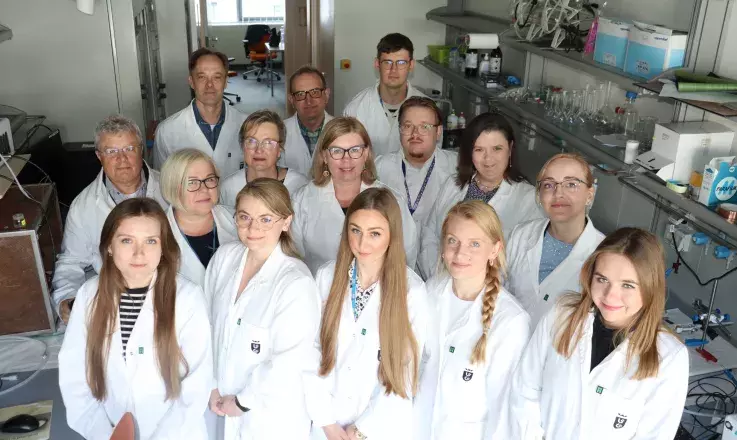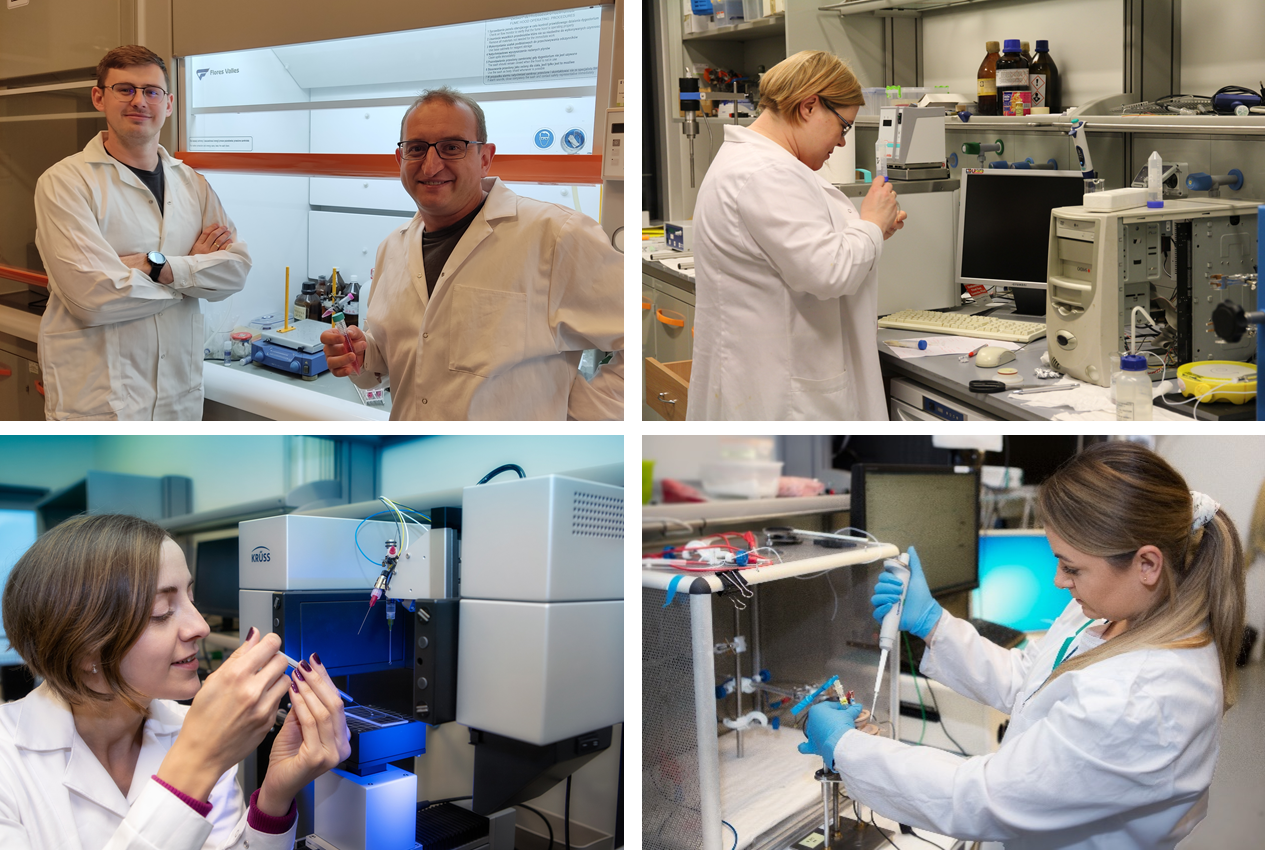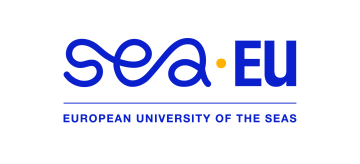

BEATA GROBELNA is a chemist and professor at the University of Gdańsk (UG). She graduated from a technical school in Gdańsk in 1988 and earned her Master of Chemistry degree from UG in 1993. In 1998, she received her PhD in Chemical Sciences, joining the Faculty of Chemistry at UG that same year. She further specialized in Cosmetology, completing postgraduate studies in 2008, and undertook an internship in the USA in 2011 focusing on fluorescence technologies.
Since 2014, she has held a habilitation degree and became an Associate Professor at UG in 2015. She has held various leadership roles within the Faculty of Chemistry at UG, including Coordinator for the Baltic Science Festival (2007-2015), Dean's Proxy for employer cooperation (2009-2016), Head of the Laboratory of Chemistry and Analytics of Cosmetics (since 2013), and Vice-Dean for Education and Development (2016–2020). Since 2020, she has been the Dean of the Faculty. She is also Head of the analytical Chemistry Department.
Her research focuses on material engineering and chemical nanotechnology. She specializes in creating new hybrid materials and nanolayers, often doped with lanthanide ions or biologically active compounds. Her work also involves synthesizing noble metal nanoparticles and core-shell structures for applications in material engineering, spectroscopy, and cosmetics. She has led numerous projects funded by various national and regional scientific bodies.
She is the author of many significant scientific publications in leading journals, covering topics such as coordination complexes, luminescence in xerogels, and studies on silver and silica nanoparticles for various applications, including skincare.
In recognition of her teaching excellence, she received the Krzysztof Celestyn Mrongowiusz award in 2011. She is an active member of the Polish Chemical Society (since 2012) and the Gdańsk Scientific Society (since 2016). In 2022, she was honored with the Medal of the 100th Anniversary of the Society of Friends of Science and Art in Gdańsk.
ORCID: https://orcid.org/0000-0003-2122-2238
Scopus: https://www.scopus.com/authid/detail.uri?authorId=6506308416
Department of Analytical Chemistry: Unraveling Molecular Interactions
At the Department of Analytical Chemistry, our research focuses on chemistry and intermolecular interactions in solutions and at solid-liquid interfaces, leveraging expertise in electrochemistry and spectroscopy.
Our Research Focus
We're actively involved in:
- Cosmetic Chemistry: Developing new cosmetic formulations, and studying active substance permeability and skin hydration.
- Luminescent Materials: Synthesizing and characterizing new luminescent materials, both solid and thin-film, based on lanthanide ions or organic fluorophores.
- Chiral Catalysis: Creating novel chiral homogeneous and heterogeneous catalysts from vanadium(V) and molybdenum(VI) complexes with optically active ligands. We analyze their molecular structures and catalytic activity.
- Electrode Materials & Surface Properties: Developing and modifying electrode materials (GC, BDD, ITO, FTO, Au) for biochemical analytics and diagnostics, focusing on surface modification, morphology, and wettability measurements.
- Molecular Recognition & Chemical Analysis: Studying molecular recognition processes and developing advanced detection methods for inorganic and organic compounds, proteins, viruses, and bacteria.
- Material Synthesis: Creating diverse materials through organic synthesis (e.g., anthraquinone derivatives, vanadium/molybdenum complexes) and producing a range of hybrid nanomaterials, including Au and Ag nanoparticles, core-shell structures, and Fe3O4 magnetic nanoparticles.
Key Techniques Employed
To achieve our research goals, we utilize a comprehensive suite of advanced techniques, including:
- Electrochemistry (voltammetric techniques, EIS, DEIS, potentiometry, coulometry, conductometry)
- Spectroscopy (IR, UV-Vis, Circular Dichroism, 1D and 2D NMR)
- Wettability Measurements (contact angle, surface free enegry, surface tension)
- Quantum Modeling
- 3D-printing (e.g. PLA electrodes)
Innovations & Collaborations
We are dedicated to developing new analytical tools using electrochemical techniques to enhance detection capabilities. Our research also extends to quantum modeling of biological systems, neurotransmitters, and intermolecular interactions.
Beyond research, our team holds numerous patent applications, particularly for anti-cancer compounds. We foster strong scientific collaborations with Polish and international institutions.
The Department of Analytical Chemistry is equipped with cutting-edge instrumentation, supporting both standard analyses and highly specialized chemical research.
Our capabilities include:
Surface and Interfacial Analysis
We utilize a Drop Shape Analyzer goniometer for in-depth analysis of solid and liquid interactions, crucial for understanding wetting and coating processes. This allows for precise measurements of contact angle (liquid-solid interface), surface tension (liquid-liquid interface), and interfacial tension.
Electrochemistry and Molecular Recognition
Our potentiostats and galvanostats enable a range of electrochemical measurements, including cyclic voltammetry (CV), differential pulse voltammetry (DPV), square wave voltammetry (SWV), and electrochemical impedance spectroscopy (EIS). These methods are vital for developing innovative molecular recognition techniques, allowing us to investigate processes at solid-liquid and liquid-liquid interfaces to create new qualitative and quantitative analytical methods.
Spectroscopic and Microtitration Analysis
We employ UV-Vis spectrophotometers with automated titrating systems to analyze luminescent and chromophore compounds. Additionally, our laboratories are equipped with microtitrators, allowing for accurate potentiometric and spectrophotometric titrations even with very small sample volumes.
Advanced Synthesis Capabilities
Beyond physicochemical measurements, our laboratories are well-equipped for complex syntheses. Featuring high-quality glassware, an HPLC system, and a CEM microwave synthesizer, we can synthesize a wide array of compounds, including crown ethers, anthraquinone derivatives, peptide systems, and modify various organic compounds and matrices, and create nanomaterials such as AuNPs or core-shell structures.
Cosmetic Product Analysis
For our work in cosmetic chemistry, we utilize specialized equipment such as a corneometer for assessing skin hydration and a dedicated system for studying the permeability of cosmetic substances.
Innovative Lab Technology
Recently, the Department has integrated a 3D printer into its operations. This allows us to rapidly produce custom laboratory equipment components and innovative measuring electrodes made from PLA.
